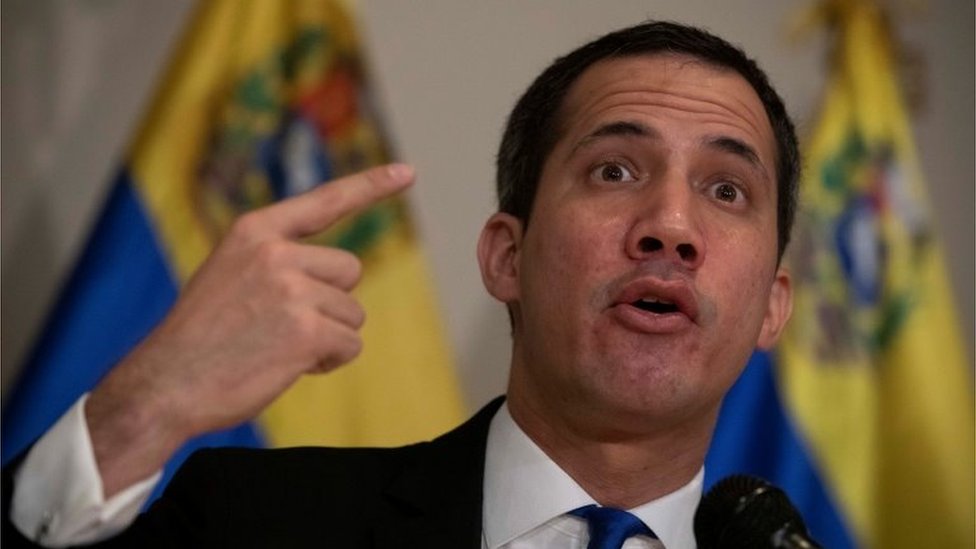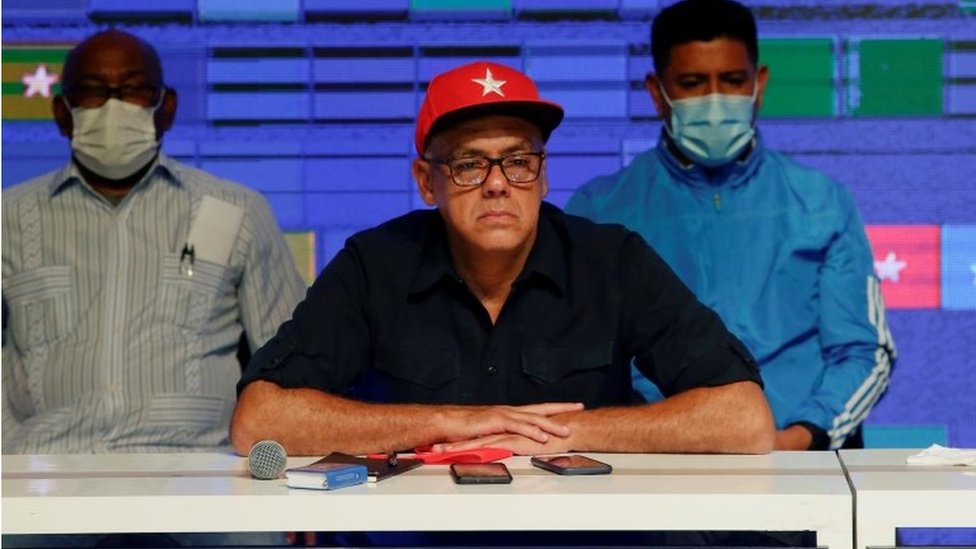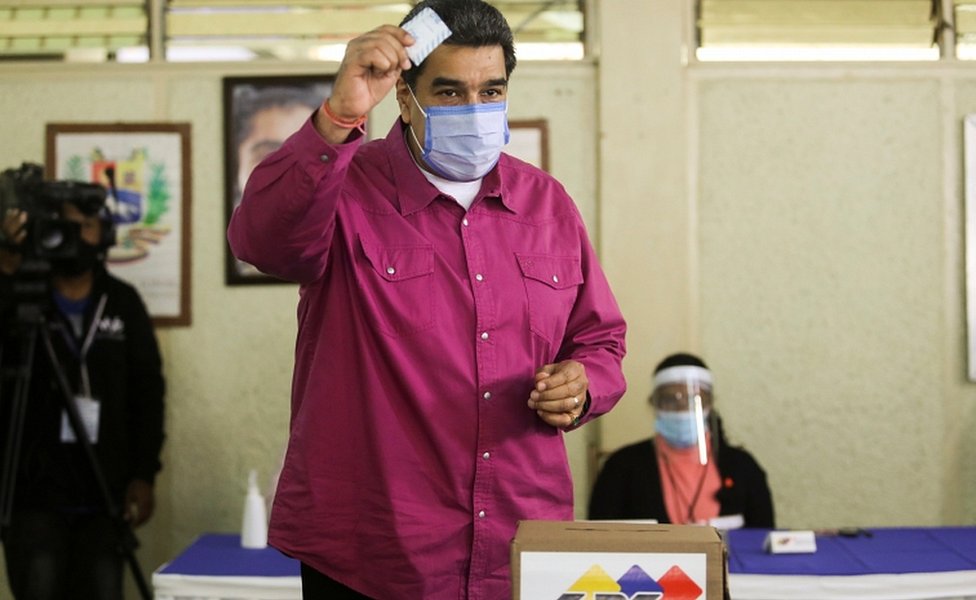Polls hand Maduro total control in Venezuela
President Nicolás Maduro’s party and allies have won in Venezuela’s legislative elections, boycotted by the main opposition parties.
With over 80% of ballots counted, his coalition had 67.6% of the vote, the National Electoral Council said.
The victory means that Mr Maduro now has total control of the country’s political institutions.
The boycott is being led by opposition leader Juan Guaidó who has been in a two-year power struggle with Mr Maduro.
An opposition bloc which broke the boycott and took part received 18% of the vote, and turnout was 31%, National Electoral Council (CNE) President Indira Alfonzo said.
What does the result mean?
The National Assembly, the only institution controlled by the opposition, will now be dominated by Mr Maduro’s party and others backing him.
The National Assembly, the legislative body which passes laws and approves the government’s budget, has long been a thorn in the side of the Maduro Administration.
So much so that in 2017 Mr Maduro convened a National Constituent Assembly, exclusively made up of his supporters.
While nominally created to draft a new constitution, the National Constituent Assembly, whose powers supersede those of the National Assembly, instead passed laws, side-lining the opposition-controlled National Assembly.
But the National Assembly retains a key role. Under Venezuela’s constitution, the government needs the National Assembly’s approval to ratify international treaties and to sign major contracts with foreign companies.
Once the new lawmakers are sworn in on 5 January 2021, the checks and balances which the National Assembly is supposed to provide will fall by the wayside.


The government may now be in control of the National Assembly but the low turnout was hardly a “win”.
Sure, there were people who cast their vote, some still clinging to the man in power, others citing their democratic right as well as many more fearful of repercussions like losing food handouts if they didn’t.
But for the most part, there’s an atmosphere of resignation. Most Venezuelans I’ve spoken to this past week saw little point in these elections and decided there were better things to be doing on Sunday.
The vast queues at petrol stations rather than the polling stations explain what you need to know about politics here – that Venezuelans just want to survive another day and for politics to just go away.

What does this mean for Juan Guaidó?
Juan Guaidó became the speaker of the National Assembly in 2019. He and his supporters argued that the 2018 re-election of Mr Maduro as president had been “neither free not fair” and that the presidency was therefore vacant.

He invoked a passage in the constitution which stipulates that in cases in which the presidency is vacant, the speaker should take over as interim president.
With the backing of the National Assembly, he swore himself in as interim president on 23 January 2019. He was quickly recognised as Venezuela’s legitimate leader by the US and more than 50 other countries.
However, Mr Maduro remained in control of government institutions, most of the judiciary, the electoral authorities and the military, and continued to govern from the presidential palace.
Mr Guaidó urged voters to boycott this month’s legislative election, saying the electoral authorities were stacked with government loyalists, and the vote would be neither free nor fair.
But it means that once the new lawmakers are sworn in on 5 January 2021, he will no longer be speaker and his claim to the interim presidency will come under question.
Mr Guaidó has already announced that he will hold a week-long “popular consultation”, a kind of referendum, from Monday in which he will ask Venezuelans whether they accept the results of the National Assembly election and whether they want a change of government.
With voter turnout in Sunday’s legislative election so low, he hopes for a bigger turnout in the popular consultation and plans to argue that his legitimacy as interim leader stems from the support he receives in that vote.
A senior figure in the Maduro government threatened members of the outgoing National Assembly with arrest.

Former Communications Minister Jorge Rodríguez, right-hand man of Mr Maduro, said on 2 December that opposition politicians would be “jailed after the 5 of January because they’re thieves, drug traffickers, traitors to the fatherland”.
What’s the reaction been?
Mr Maduro was triumphant and said the election would mark the beginning of an era of recovery for Venezuela, which has been mired in an economic crisis which has led to more than 4.5 million people leaving the country.

“People have elected their new lawmakers, and we have had a tremendous and gigantic electoral victory,” he said when the results were announced.
Mr Guaidó said the low turnout showed that the majority of Venezuelans had “turned their backs on Maduro and his fraud”. “Those who are scared of the people are the ones who commit fraud, and Maduro and his regime lost the popular vote,” he said.
US Secretary of State Mike Pompeo described Sunday’s poll as “a fraud and a sham”. “The results announced by the illegitimate Maduro regime will not reflect the will of the Venezuelan people,” he posted on Twitter.
Brazil’s Foreign Minister Ernesto Araújo called it an “electoral farce” and an attempt by the Maduro “dictatorship” to legitimise its rule.
The Organization of American States (OAS) has also said it will not recognise the result.
What’s the background?
Under the Maduro government, the economy has collapsed and shortages of food and medicines have become widespread.
According to the United Nations refugee agency (UNHCR), there are currently about 4.5 million refugees and migrants from Venezuela worldwide.
The US has imposed stringent sanctions on the Maduro government which have further exacerbated fuel shortages leading to long queues at petrol stations.
Dozens of opposition politicians have been jailed and others have fled into exile.



